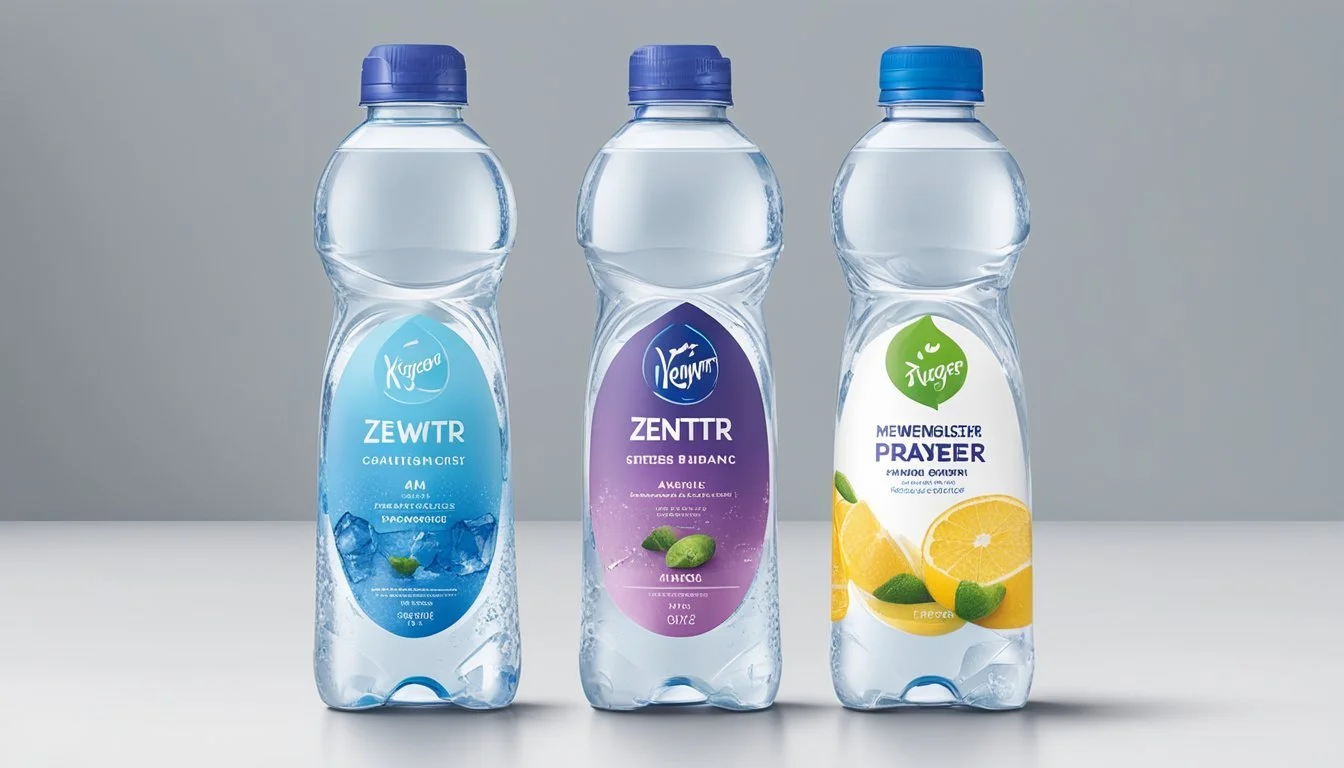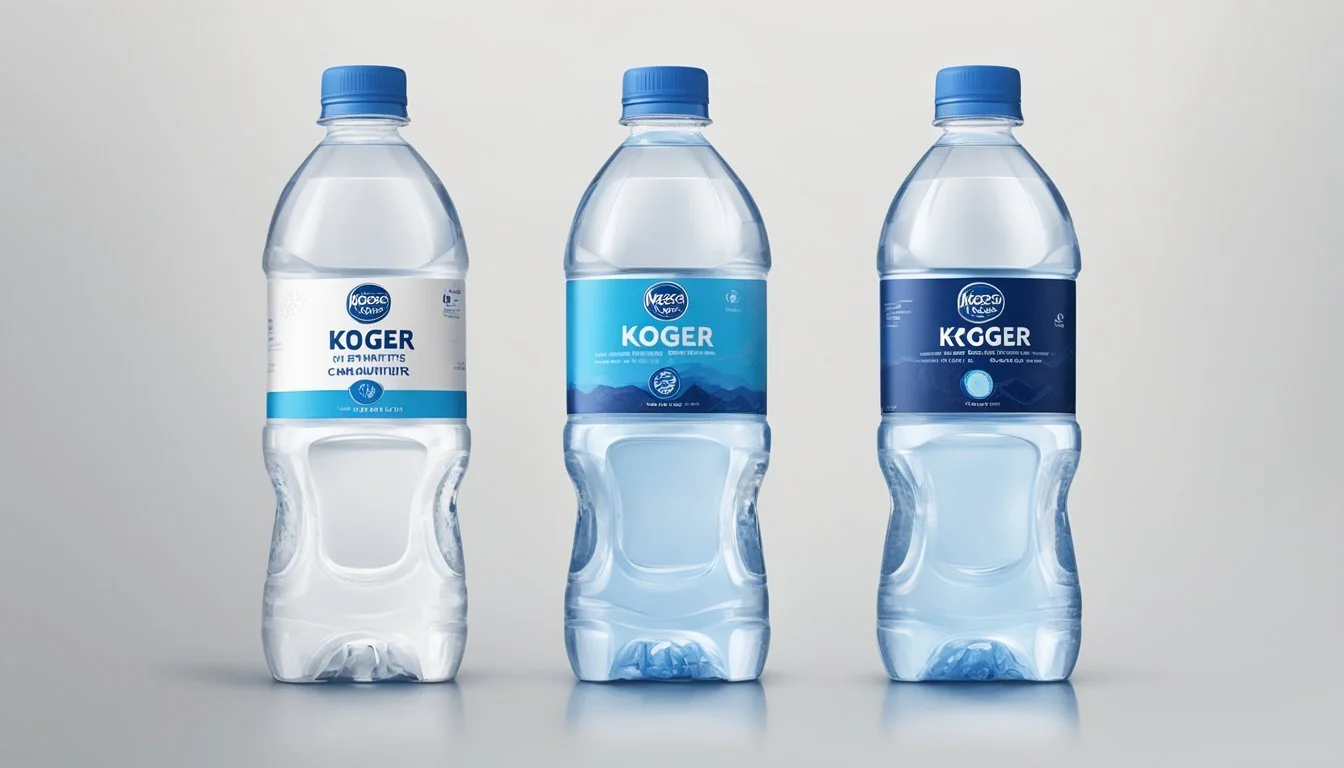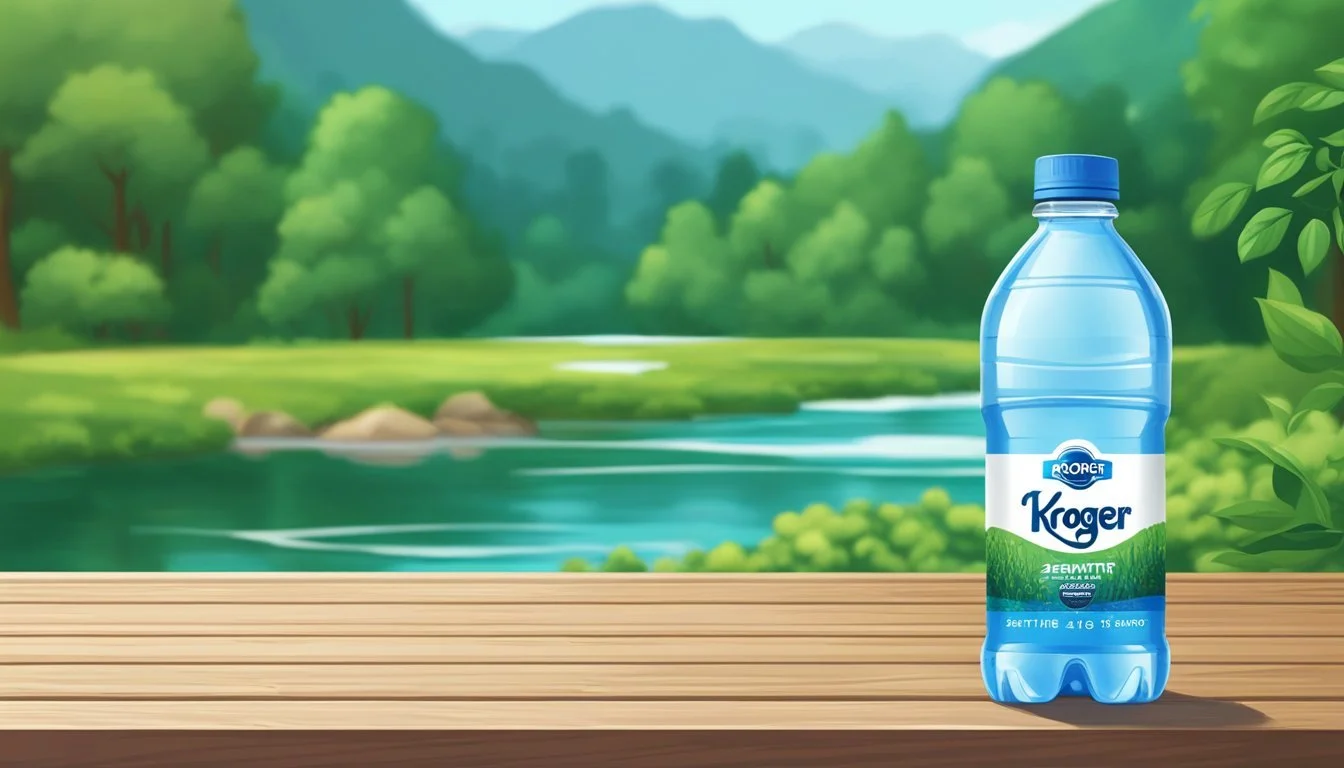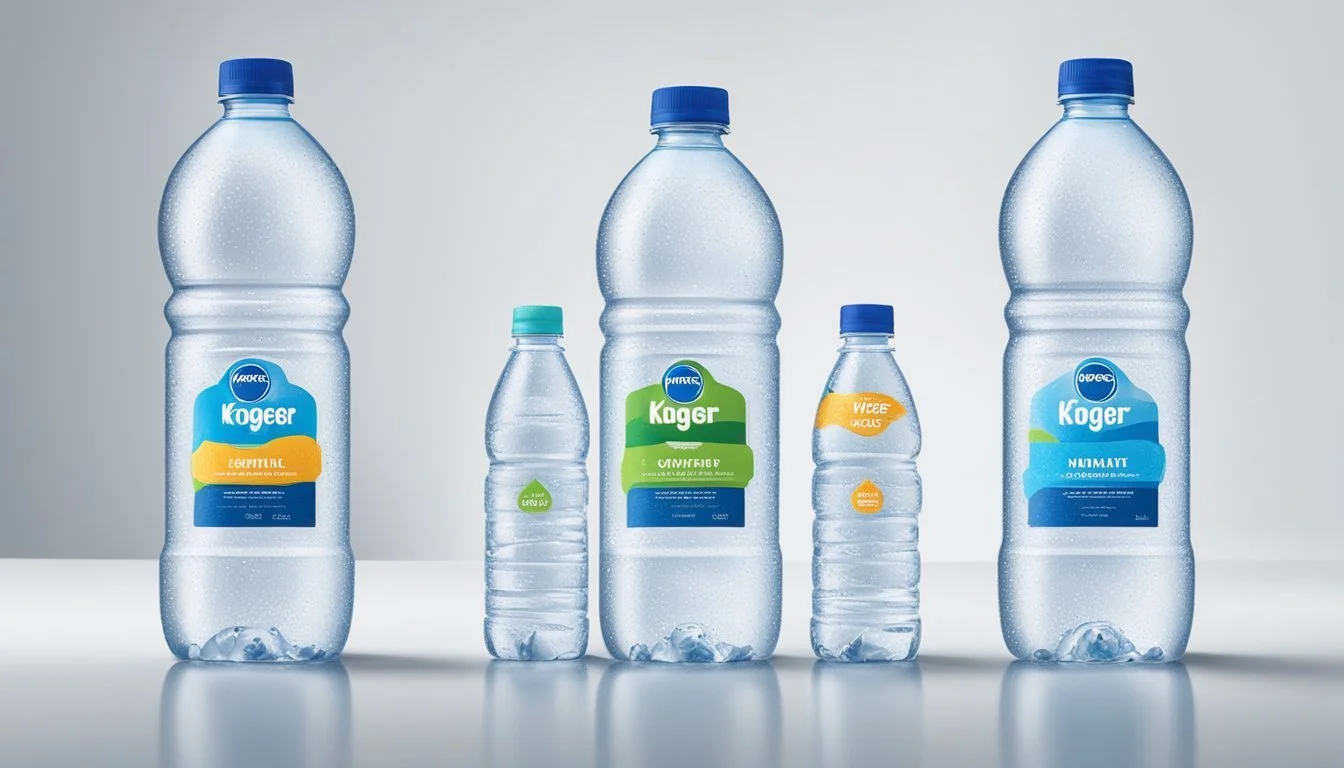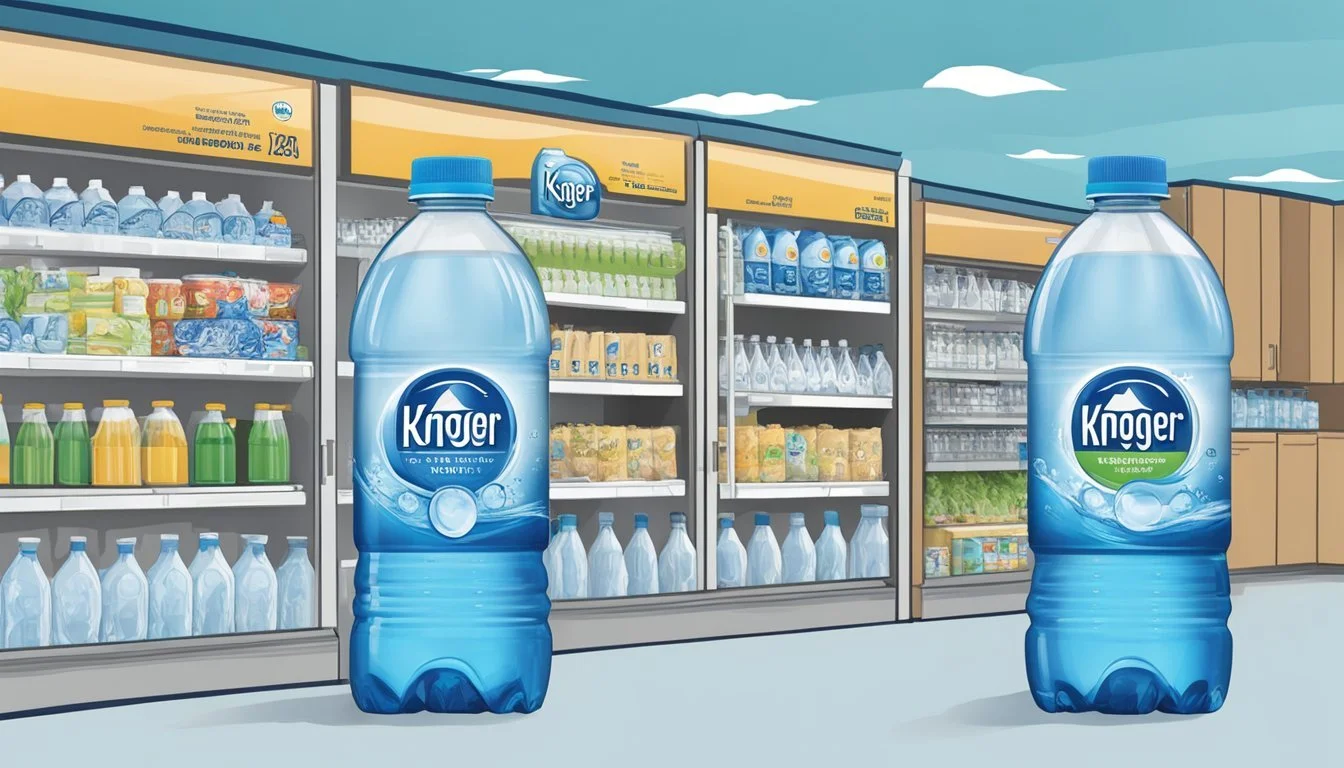Kroger vs. Zenwtr
Comparing Bottled Water Quality
Choosing between Kroger bottled water and ZenWTR can be quite a task for the discerning consumer. Both brands offer unique selling points, making it essential to weigh their respective benefits and drawbacks. Kroger bottled water adheres to FDA regulations, ensuring safety and quality, though concerns about contaminants like microplastics and BPA still exist.
ZenWTR, known for its natural alkalinity with a pH of 9.5, stands out among other alkaline waters that rely on artificial additives. Many users find ZenWTR's commitment to reducing plastic pollution and its superior alkalinity to be crucial factors in their purchasing decision.
While Kroger bottled water provides a more ubiquitous and affordable option, ZenWTR attracts health-conscious consumers and those with environmental concerns. This comparison will delve deeper into these aspects to help you decide which bottled water best suits your needs.
Overview of Kroger and ZenWTR
Kroger and ZenWTR are two notable brands in the bottled water market. Kroger is known for its affordability and wide accessibility, while ZenWTR focuses on sustainability and the quality of its alkaline water.
Brand Histories
Kroger
Kroger, founded in 1883 by Bernard Kroger in Cincinnati, Ohio, has grown to become one of the largest supermarket chains in the United States. The company offers a wide range of products including grocery, pharmacy, and general merchandise. Kroger’s bottled water is produced and sold under the Kroger name, adhering to FDA regulations to ensure safety and quality.
ZenWTR
ZenWTR is a relatively newer brand committed to sustainability. Launched to combat plastic pollution, it uses 100% recycled ocean-bound plastic for its bottles. ZenWTR aims to provide ultra-pure alkaline water with a pH of 9.5. The brand emphasizes environmental responsibility, reflecting its mission to conserve the planet’s resources.
Product Range
Kroger
Kroger's product range includes multiple types of bottled water such as spring water, distilled water, and purified water. The bottled water is generally budget-friendly, ensuring it meets diverse customer needs. Kroger maintains primary focus on delivering safe, cost-effective bottled water, making it accessible to a broad population base.
ZenWTR
ZenWTR primarily offers alkaline water with a pH of 9.5, achieved through a meticulous 8-step purification process, including vapor distillation and ionization. The brand stands out for its environmental commitment, utilizing bottles made from recycled plastic. ZenWTR targets health-conscious consumers who prioritize both water quality and ecological impact.
Hydration and Health Benefits
Choosing between Kroger and ZenWTR bottled water involves looking closely at how each brand supports hydration and overall health. Each brand offers different attributes that impact hydration, nutrient intake, and health benefits.
Hydration Essentials
Hydration is crucial for maintaining bodily functions like digestion, temperature regulation, and joint lubrication.
Kroger Bottled Water adheres to FDA regulations, ensuring it meets safety and quality standards. It provides essential hydration but lacks additional features.
ZenWTR stands out with its pH of 9.5, making it alkaline and potentially more beneficial for those who believe that alkaline water improves hydration. It may help balance body acidity levels, offering a unique form of hydration.
Comparing the two, ZenWTR’s higher pH level and potential for better hydration might appeal to some users. Kroger's straightforward approach ensures basic hydration needs are met without extra frills. Both serve the fundamental purpose of keeping users hydrated.
Health Considerations
Health benefits of bottled water can extend beyond mere hydration. Important factors include mineral content and absence of harmful contaminants.
Kroger Bottled Water is noted for adhering to stringent safety standards, minimizing exposure to harmful substances. Some concerns about microplastics and BPA exist, although BPA-free options are available. This ensures safety but may not offer additional health benefits.
ZenWTR not only addresses hydration but also promotes environmental friendliness by using recycled ocean-bound plastic bottles. With a pH of 9.5, it's perceived to offer health benefits like neutralizing body acidity. This can be a plus for those looking for both health and environmental benefits.
In summary, ZenWTR may offer added health considerations with its alkaline nature and environmentally conscious packaging, while Kroger provides a reliable and safe option for hydration without additional features.
Water Sourcing and Quality
Both Kroger and ZenWTR offer distinct characteristics regarding the origin of their water and the measures they take to ensure its purity and quality.
Source Transparency
Kroger sources its bottled water from municipal supplies, often undergoing treatment processes like reverse osmosis to purify it. Details about the specific municipalities are usually available on the bottle label or the company’s website. This transparency helps consumers understand the origin of the water they are drinking.
ZenWTR, on the other hand, sources its water from a sustainable underground aquifer in mountainous regions. The label on ZenWTR bottles typically mentions this pristine source, promoting its premium natural origin. This transparency not only builds trust but also emphasizes the unique qualities of their water source compared to typical municipal supplies.
Quality Assurance
Kroger implements several filtration methods, including reverse osmosis, to remove contaminants and ensure the safety of their bottled water. These processes are designed to meet regulatory standards, offering consumers a reliable option. Many consumers find comfort in Kroger’s adherence to stringent quality protocols, knowing that their water has been treated to ensure safety.
ZenWTR focuses on maintaining the natural alkalinity of its water, boasting a pH level of 9.5. Additionally, their filtration process, while rigorous, is designed to preserve the water’s natural minerals and alkalinity. This meticulous approach not only guarantees purity but also enhances the water's health benefits. Consumers seeking naturally sourced, high-alkaline water often prefer ZenWTR for these reasons.
Taste and Water Properties
When comparing Kroger bottled water and ZenWTR, it's essential to consider both the taste profile and the specific properties of each water, such as pH levels and mineral content. These factors play a significant role in consumer preference and potential health benefits.
Taste Profile
Kroger bottled water is often noted for its clean and neutral taste. It adheres to safety and quality standards, making it a reliable choice for many consumers. Some people may notice a slight plastic taste, which can be off-putting.
In contrast, ZenWTR, thanks to its vapor-distilled process, offers a purer taste profile. It avoids the plastic-like taste that some waters have. Consumers appreciate its refreshing and clean flavor without any unpleasant aftertaste.
Brand Taste Characteristics Kroger Clean, neutral, slight plastic taste potential ZenWTR Pure, refreshing, no plastic-like aftertaste
pH Levels and Mineral Content
Kroger bottled water is typically neutral or slightly acidic, aligning with many standard purified waters. Its mineral content is designed to meet safety standards without aiming for high alkalinity.
ZenWTR stands out with its naturally alkaline pH of 9.5. This high pH level is achieved through a detailed process involving advanced filtration and ionization. Alkaline water like ZenWTR is often sought after for its potential to balance the body's pH levels and its perceived health benefits.
Brand pH Level Mineral Additives Kroger ~7 Standard mineral content ZenWTR 9.5 Naturally balanced minerals
ZenWTR's vapor distillation and subsequent ionization ensure that it maintains a consistent alkaline pH. The minerals and electrolytes in ZenWTR contribute to its unique properties, making it a preferred choice for those looking for alkaline options.
In summary, the taste and water properties of Kroger and ZenWTR offer distinct experiences, with ZenWTR providing a more specialized, alkaline option.
Packaging and Environmental Impact
ZenWTR and Kroger bottled waters differ significantly in their choice of bottle materials and sustainability efforts. These differences influence their environmental impact and consumer appeal.
Bottle Materials
ZenWTR uses 100% recycled plastic for their bottles, specifically recycled PET (rPET) made from certified ocean-bound plastic. This choice underscores their commitment to reducing plastic waste in oceans and offers an eco-friendly alternative to traditional plastic bottles.
On the other hand, Kroger primarily utilizes conventional PET plastic for their bottled water. While some of their bottles are now BPA-free, the use of virgin PET plastic raises concerns regarding its environmental footprint, including the potential presence of microplastics.
Sustainability Efforts
ZenWTR showcases a strong commitment to sustainability by opting for recycled materials in their packaging. They have also announced plans to introduce aluminum and glass bottles, which are inherently easier to recycle compared to plastic. These efforts aim to meet diverse consumer preferences while reducing environmental impact.
Kroger follows FDA regulations to ensure safety and quality but lacks the same level of focus on sustainable packaging as ZenWTR. This leads to increased pollution and waste from their PET bottles. The environmental impact extends to CO2 emissions, as bottled water production inherently generates significant amounts of CO2, particularly when not using recycled materials.
In sum, ZenWTR prioritizes eco-friendly packaging, employing innovative materials to minimize environmental harm, whereas Kroger maintains a more traditional approach with less emphasis on sustainability.
Water Purification and Enhancement Processes
Several factors differentiate bottled water brands, with purification and enhancement processes being among the most crucial. This section examines how Kroger and ZenWTR approach these methods to deliver high-quality bottled water.
Purification Techniques
Kroger’s bottled water undergoes an eight-step process that guarantees its purity and taste. This process includes advanced micron and carbon filtration, reverse osmosis, and UV treatments.
Reverse osmosis removes various contaminants, ensuring the water is clean. UV treatments help eliminate any potential microbial threats. ZenWTR also follows an eight-step purification process, utilizing similar techniques.
Vapor distillation is a key component for ZenWTR. Through this process, water is distilled to remove impurities. After distillation, it's passed through electrolytes to enhance the overall mineral content.
Enhancement Procedures
After undergoing rigorous purification, Kroger and ZenWTR add enhancements to improve the quality and health benefits of their water.
ZenWTR introduces electrolytes to the water post-purification, which not only improves hydration but also contributes to taste. With a pH level of 9.5, ZenWTR's water is highly alkaline, which some consumers believe offers additional health benefits.
Core Hydration follows a similar practice, adding essential minerals and electrolytes to its water. These enhancements are designed to offer optimized hydration. Both brands utilize ionization to achieve their alkaline properties, ensuring the water is not only pure but also beneficial for health-conscious consumers.
Comparison of Customer Perceptions
Consumers have differing views on Kroger and ZenWTR bottled water regarding taste, brand loyalty, and market performance.
Consumer Reviews
ZenWTR is praised for its natural alkalinity and environmental commitment. Customers appreciate its pH of 9.5 and the use of 100% ocean-bound plastic bottles. Many feel good about contributing to reducing plastic pollution. Meanwhile, Kroger bottled water is seen as reliable but less distinctive. It is often chosen for its affordability and availability, especially among budget-conscious shoppers. The taste is considered clean, but lacks the unique qualities highlighted in ZenWTR reviews.
Market Performance
ZenWTR has positioned itself strongly in the premium bottled water market. Its eco-friendly approach and naturally alkaline water attract environmentally conscious consumers. Reports show a significant positive feedback loop, bolstering brand loyalty. Kroger, on the other hand, dominates through its extensive retail network and pricing strategy. Kroger’s bottled water benefits from the brand’s broad market presence and a loyal customer base looking for cost-effective hydration solutions, even if it doesn't have the same premium appeal as ZenWTR. Both brands excel, but cater to different consumer priorities.
Regulations and Industry Standards
When comparing Kroger and Zenwtr bottled water, it is crucial to examine their compliance with FDA regulations and adherence to IBWA guidelines. Both brands aim to ensure safety and quality, but key differences in regulatory focus and transparency may influence consumer choice.
FDA Compliance
The FDA regulates the safety of bottled water through stringent standards set by the Federal Food, Drug, and Cosmetic Act (FFDCA) and Title 21 of the Code of Federal Regulations. Bottled water must meet these safety and quality requirements, which include setting maximum levels for contaminants such as chemical and physical substances. Kroger bottled water adheres to these regulations, ensuring its product is safe for consumption.
Zenwtr also complies with FDA regulations. They ensure transparency by providing information on their water sources and purification processes on their labels and websites. This transparency helps consumers make informed decisions regarding water quality. Both brands' adherence to FDA regulations ensures that their bottled water is held to high safety and quality standards, but their approaches to transparency and reporting may differ.
IBWA Guidelines
The International Bottled Water Association (IBWA) sets additional guidelines that many bottled water companies follow to exceed basic regulatory requirements. These guidelines cover aspects like bottling practices, facility inspections, and water quality testing. Kroger is a member of IBWA, which means they meet these higher standards, contributing to product safety and consumer confidence.
Zenwtr follows IBWA guidelines as well, ensuring their water undergoes rigorous testing and quality checks. Membership in IBWA indicates a commitment to high production standards and improved safety measures. The IBWA's role in setting industry benchmarks helps elevate the standards for bottled water safety beyond what federal regulations require. This commitment to IBWA guidelines ensures both Kroger and Zenwtr maintain high-quality products.
Final Thoughts
In evaluating Kroger and ZenWTR bottled water, several factors such as pH levels, environmental impact, and consumer satisfaction come into play. Here is a detailed comparison that should help make an informed decision.
Summary of Key Points
ZenWTR's main advantage lies in its natural alkalinity with a pH of 9.5, which appeals to consumers seeking alkaline water. It promotes itself as environmentally conscious, using recycled ocean-bound plastic. Customer feedback for ZenWTR has been notably positive, highlighting both taste and sustainability.
Kroger's bottled water, on the other hand, generally has a standard pH level and is more cost-effective. It offers reliability but lacks the specialized features of ZenWTR. Convenience is another strong point for Kroger, given its widespread availability in stores across the United States.
Both brands have strong points in terms of taste and availability. ZenWTR edges ahead with its environmental promise and alkaline benefits, whereas Kroger appeals to budget-conscious consumers.
Making an Informed Choice
When choosing between Kroger and ZenWTR, consider what matters most to you. If budget and ease of access are key, Kroger offers a reliable and convenient option. Kroger's water is neutral in pH and readily available in many stores, making it a practical daily choice.
For those prioritizing health benefits and environmental sustainability, ZenWTR is the better pick. Its high pH level may be beneficial for those seeking alkaline water. The brand's commitment to using recycled materials also aligns with environmentally-conscious values, making it a responsible choice for eco-aware consumers.
Ultimately, the decision should reflect personal preferences, whether it's ZenWTR's alkaline advantage and eco-friendliness or Kroger's affordability and convenience.
More About Kroger
Kroger vs Kirkland Signature: Which Bottled Water is Better?
Kroger vs Richard's Rainwater: Which Bottled Water is Better?
Mountain Valley Spring Water vs Kroger: Which Bottled Water is Better?
Whole Foods Italian Still Mineral water vs Kroger: Which Bottled Water is Better?

